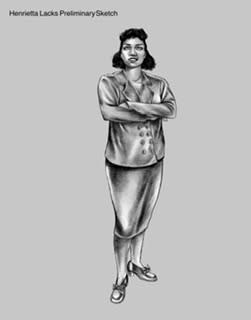A statue dedicated to Henrietta Lacks, a Black woman whose “immortal cells” were taken without her consent and used for scientific research, will take the place of a statue of Confederate Gen. Robert E. Lee in her Virginia birthplace.
The Roanoke Hidden Histories project, in conjunction with the Harrison Museum of African American Culture, raised more than $160,000 in order to produce the statue of Lacks. A rough sketch of the life-size sculpture was revealed to the public on Monday.
“Working on this project was a huge honor for me. I’m grateful for the Lacks family for entrusting not only me but all the individuals involved in this project with the task of honoring the legacy of Henrietta Lacks,” said Roanoke artist Bryce Cobbs. “Their bravery, strength and willingness to give knowledge is so commendable and was a major inspiration for me along this journey.”

To highlight the contribution of African Americans to society, the city also renamed the plaza where the statue will be erected, “Lacks Plaza.”
The plaza was once the site of a statue of Lee, which was torn down in 2020.
With the blessing of the Lacks family, Henrietta’s legacy as a key in cancer cell research history, which provided the world with decades of lifesaving medicine, will live on in her hometown of Roanoke.
Her eldest son and grandson were present at the unveiling of the sculpture rendering.
“Roanoke is the first to reach out to Henrietta Lacks’ estate. This a big deal,” said her grandson Ron Lacks.
In the 1950s, Lacks’ cervical cancer cells were collected at the Johns Hopkins University in Baltimore, Maryland. Her cells showed that they would double every 20 to 24 hours rather than die like other collected samples.
Her “immortal cells” were taken without her consent, and she was never informed that these cells would go on to be used in nationwide scientific research that would usher in a new wave of groundbreaking biomedical discoveries.
These “HeLa” cells are still used to study the effects of toxins, drugs, hormones and viruses on the growth of cancer cells without experimenting on humans.
The statue is expected to be erected in fall of 2023.








